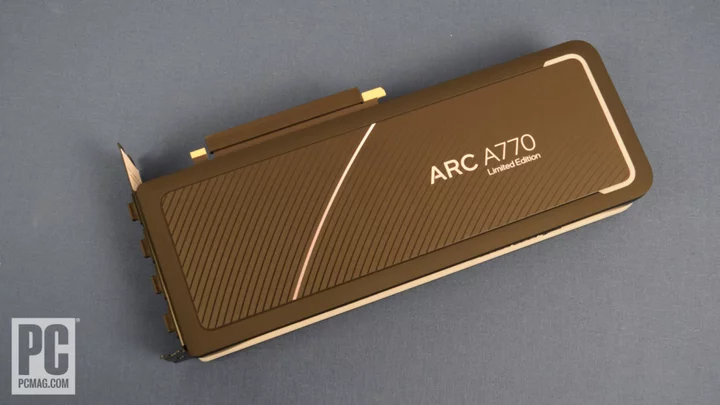It’s easy to ignore or even forget Intel’s desktop GPUs. But the company has been working to squeeze out even more performance from its Arc graphics cards, thanks to driver updates made over the last three releases.
According to Intel, the Arc GPUs can now perform on average 12% to 19% better on DirectX 11 games compared to when the cards first launched in October.
As evidence, the chip maker released a benchmark showing the Intel Arc 750 card running a variety of DirectX 11 titles using a Core i5 13400F chip at 1080p video quality. The new drivers are able to boost the performance on average to 19% across 11 games.
(Credit: Intel) (Credit: Intel)Intel also ran the benchmark, but using a top-tier Core i9 13900K processor, which has 24 cores and can already push the performance up even more. The benchmark showed the new Arc driver can still increase the frame rates while using a Core i9 chip, but at a lower 12% average when compared to old driver.
“A lot of the time our performance is CPU-limited,” Intel fellow Tom Petersen said in a press briefing. “We have a history of integrated graphics, where you are always GPU-limited. So some of the archteciture of our driver kind of had this model, ‘I have infinite CPU resources because no matter what I’m always going to be bottlenecked on my GPU.’”
(Credit: Intel) (Credit: Intel)“Well obviously with Arc that changed,” he added. “Now you have a big GPU, and a lot of the time you are CPU-limited. So the driver needed to be rearchitected to reduce the amount of CPU work required per frame.”
As a result, Intel Arc GPUs have been designed to see more benefit when CPU resources are limited, like when using a mid-tier Intel chip. The resulting performance uplift can be a nice perk if you’re playing a game like Overwatch 2. Due to the driver updates, you can expect the game to run with 45 extra frames per second while running a Core i5 chip. But for other titles, such as Destiny 2, the performance improvement is less noticeable at only an 8fps improvement.
The company was able to squeeze out the additional frames by rearchitecting the Arc GPU driver for DirectX 11, which Intel previously did for the DirectX 9 driver in December. Although DirectX 11 was first released in 2009, the gaming API is used in many popular games still played today, such as Dota 2, GTA Online, and Valorant.
That said, the performance claims from Intel should be taken with a grain of salt. The company is still working on making all DirectX 11 games compatible with the rearchitected driver. So for now, the company only has benchmarks for a select catalog of DirectX 11 games. But according to Intel's Petersen, you can expect other DirectX 11 titles to reap performance benefits in the same range. He added that Intel plans on expanding the Arc GPU drivers to the remaining DirectX 11 games “over the next couple of months."
Today's other notable announcement is an Intel tool called “PresentMon Beta,” which can give users a more detailed look at their GPU’s performance. It goes beyond merely posting a game’s FPS rate, by also showing you how busy the GPU is, the temperature, voltage levels, and the video memory levels being used, along with additional stats.
(Credit: Intel)The tool, now available on GitHub and Intel’s own site, is also open-sourced and designed to work with third-party GPUs from Nvidia and AMD.
According to Petersen, the tool promises to help users optimize their PC settings by uncovering potential bottlenecks that could slow down a GPU’s performance. “We have improved the way performance statistics are gathered and hopefully we’re making it a little bit more informative by bringing out more detail on performance,” he said.
(Credit: Intel)
